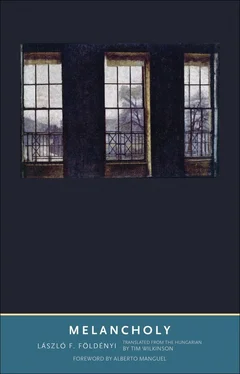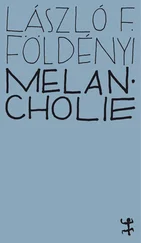László Földényi - Melancholy
Здесь есть возможность читать онлайн «László Földényi - Melancholy» весь текст электронной книги совершенно бесплатно (целиком полную версию без сокращений). В некоторых случаях можно слушать аудио, скачать через торрент в формате fb2 и присутствует краткое содержание. Год выпуска: 2016, Издательство: Yale University Press, Жанр: Современная проза, на английском языке. Описание произведения, (предисловие) а так же отзывы посетителей доступны на портале библиотеки ЛибКат.
- Название:Melancholy
- Автор:
- Издательство:Yale University Press
- Жанр:
- Год:2016
- ISBN:нет данных
- Рейтинг книги:4 / 5. Голосов: 1
-
Избранное:Добавить в избранное
- Отзывы:
-
Ваша оценка:
- 80
- 1
- 2
- 3
- 4
- 5
Melancholy: краткое содержание, описание и аннотация
Предлагаем к чтению аннотацию, описание, краткое содержание или предисловие (зависит от того, что написал сам автор книги «Melancholy»). Если вы не нашли необходимую информацию о книге — напишите в комментариях, мы постараемся отыскать её.
, with its profusion of literary, ecclesiastical, artistic, and historical insights, gives proof to such praise. His book, part history of the term
and part analysis of the melancholic disposition, explores many centuries to explore melancholy’s ambiguities. Along the way Földényi discovers the unrecognized role melancholy may play as a source of energy and creativity in a well-examined life.
Földényi begins with a tour of the history of the word
from ancient Greece to the medieval era, the Renaissance, and modern times. He finds the meaning of melancholy has always been ambiguous, even paradoxical. In our own times it may be regarded either as a psychic illness or a mood familiar to everyone. The author analyzes the complexities of melancholy and concludes that its dual nature reflects the inherent tension of birth and mortality. To understand the melancholic disposition is to find entry to some of the deepest questions one’s life.
This distinguished translation brings Földényi’s work directly to English-language readers for the first time.
Melancholy — читать онлайн бесплатно полную книгу (весь текст) целиком
Ниже представлен текст книги, разбитый по страницам. Система сохранения места последней прочитанной страницы, позволяет с удобством читать онлайн бесплатно книгу «Melancholy», без необходимости каждый раз заново искать на чём Вы остановились. Поставьте закладку, и сможете в любой момент перейти на страницу, на которой закончили чтение.
Интервал:
Закладка:
But when even Bellerophon came to be hated by all the gods,
he wandered all desolate and dismayed upon the Aleian plain,
devouring his own soul,
4
and shunning the paths of men,
(Homer, Iliad , bk. 6, 200–202)
Homer recounts, and that “even” is a signal that Bellerophon had fallen victim to some dreadful principle. “A thing which is sweet beyond measure is awaited by a most bitter end,” Pindar writes by way of warning (
Isthmia
, 6). He was not driven by the depths of despair to suicide in the way Ajax was, but becoming an outcast was tantamount to death. “I too say,” he declaims to the audience, “it’s best for a man not to be born” (
Bellerophon
, 287, 1–2). Sophocles has the chorus of
Oedipus at Colonus
say the same thing, as Kierkegaard was fond of quoting: “It is best not to have been born at all: but, if born, as quickly as possible to return whence one came” (1388–91). Human life is condemned to failure from the very outset; indeed, it is not that failure will happen but that it is unceasingly present, it is continuous. Bellerophon speaks of those who suffer the fate of humans, who live a double life: a life of suffering and a life of awareness of such suffering. Human beings suffer not only from being human, but also from being fully conscious of their human predicament. Heroism and dejection emerge in the same individual, raising the suspicion that dejection and a sense of hopeless failure, of futility, seized hold
of Bellerophon precisely because he was marked out from birth for superhuman feats, outstanding actions.
The suffering and death of Heracles seem to reinforce this hypothesis. Born of an earthly mother and a celestial father, he is one of the strangest figures in Greek mythology: so human and yet superhuman that his solitude appears to be virtually predestined. He has no partners or allies; his enemies are shrouded in obscurity, just as his wife and children also hide in the background. Heracles stands before us statue-like, without any frame of reference, to the point that by dominating everything wherever he makes an appearance, he discredits reality itself, the world, the places he visits where he accomplishes his deeds, and holds all existence virtually under a spell. 5The twelve labors seem incredible even in the fairy-tale world of mythology: here the solid boundaries of existence melt away, and compared with the miraculous atmosphere of the labors, more than a few mythological stories seem downright prosaic. The very basis of Heracles’ existence is boundlessness: for him, anything is possible, and he comes to the realization (and this is what mere mortals do not experience) that anything is also possible in the world surrounding him. It is for this reason that his figure, pellucidly delimited and statuesquely rounded off, awakens a sense of infinity: as if time and space, the whole universe, were organized to suit his pleasure, to comply with his wishes. His strength, though, was at the same time his weakness: he owed his strength (not just his physical but also his “world-creating” power) to the fact that he was not a mere human and also not a divinity, but rather intermediate , being at home in both worlds. 6Yet that meant that he was truly at home nowhere: “I will unfold to you why life now, as well as formerly, has been unbearable to me.” Heracles says these words unworthy of a hero in the tragedy of Euripides (1257), after which one reads the following: “He who is always unfortunate feels no such pain, for sorrow is his birthright” (1292–94). The metaphysical homelessness cannot be lifted (when Odysseus descends into the underworld, he encounters only the body of Heracles, for his soul ascended into the divine regions; that is, not even death can put an end to this homelessness, the condition of being ripped asunder), for there is no foothold to grasp in one’s effort to render the world contained and snug: there is nowhere to set off from, and nowhere to arrive. At first, Heracles had no presentiment of all this; most likely his destiny became clear to him when, before his descent into the underworld, he had himself initiated into the Eleusinian mysteries. The mutually complementary concepts of life and death, a fateful preoccupation with boundlessness, and an anxiety over finitude made themselves felt in him there, and presumably that superior way of looking at things — one that he acquired there, a hair-raising overture for a finite mortal being — opened up the irrevocable split that he owed to his divine-human, eternal-mortal nature. After he returned from the underworld, people started worshipping him under the name Charops as well (an epithet kindred to “Charon,” the name of the ferryman of Hades), which indicated the unexpectedly frightful nature of a transformed Heracles. And the madness that erupted in him following the initiation into the mysteries and the “excursion” to the underworld, and that, as an external force, made him exterminate his own children, did not differ from the madness of Ajax and Bellerophon. “O Zeus, why hast thou shown such savage hate against thine own son and plunged him in this sea of troubles?” the chorus asks, perplexed, in Euripides’ drama Heracles (1086–87). The “troubles” signify more than simple melancholy in the present-day sense:  and
and  also denote unsuitability, weakness, badness in a moral sense, unworthiness, poverty, suffering, and misfortune.
also denote unsuitability, weakness, badness in a moral sense, unworthiness, poverty, suffering, and misfortune.  stands for an unsuitability lacking any kind of comparison. The more one is the victim of this, the less one is capable of seeing the context and measure of one’s blunder. “( Inside, we are ) a complex store-house and treasury of ills, with many possibilities of suffering,” says Democritus (Kathleen Freeman, Ancilla to the Pre-Socratic Philosophers , 105, frag. 149). The treasury that he comes upon is the irremediable and increasingly certain condemnation of his life to failure. The sea into which Heracles plunged is, in the final analysis, a sea of deprivation of something, a deficiency; and the suffering caused by madness, horrifyingly, is increased by the fact that this deficiency, the sense of an all-enveloping negativity, is the reward for perfect, unsurpassable labors. Madness is the reward for all-surpassing extraordinariness, for supereminence 7—this at least is the conclusion to which the fate of these three melancholic heroes points.
stands for an unsuitability lacking any kind of comparison. The more one is the victim of this, the less one is capable of seeing the context and measure of one’s blunder. “( Inside, we are ) a complex store-house and treasury of ills, with many possibilities of suffering,” says Democritus (Kathleen Freeman, Ancilla to the Pre-Socratic Philosophers , 105, frag. 149). The treasury that he comes upon is the irremediable and increasingly certain condemnation of his life to failure. The sea into which Heracles plunged is, in the final analysis, a sea of deprivation of something, a deficiency; and the suffering caused by madness, horrifyingly, is increased by the fact that this deficiency, the sense of an all-enveloping negativity, is the reward for perfect, unsurpassable labors. Madness is the reward for all-surpassing extraordinariness, for supereminence 7—this at least is the conclusion to which the fate of these three melancholic heroes points.
Identifying madness with melancholia, especially with the current preoccupation with psychology and clinical psychiatry, seems to give the problem short shrift. But madness in this case is also an ingredient of mythological tales, and just as the myth as a whole has a meaning, so too its separate parts have broader significance than it would appear at first sight from a rational point of view. A myth cannot be puzzled out — only, at best, endlessly unraveled — without flinching from relating it to our own situation, which itself is not much different from a maze and is in no way more solid than the soil of mythology. The same can be said about frenzy. Lyssa was the goddess, or daimona , responsible for raging madness — it was she who planted its seed in the mind of Heracles in Euripides’ drama. Her mother was Nyx, the dark personification of Night, her father, Uranus, and that family tree places madness in a wider context. Uranus is the god of the sky, and so on the paternal side, madness can be traced back to the very beginnings of existence. On the maternal side, born of the night as she is, she stems from the realm of invisible entities; for the Greeks, however, night did not just conceal things but — like the dream world — could also make the invisible visible. 8At night, a new world unfolds itself, and this new world is not merely some dreamland of the imagination: it is also related to the daytime world. In his short treatise On Prophesying by Dreams , Aristotle articulates a widespread Greek belief that in nocturnal dreams profound truths are revealed to the dreamer. The night allows us to catch a glimpse of invisible things and thus makes divination possible. Prophecy is therefore a sibling of madness , which is further confirmed by the spirit of the Greek language: the verbs to prophesy (  ) and to rage (
) and to rage (  ) go back to a common root. (At this point, it is enough to note in parentheses that Aristotle also saw a connection between melancholia and the night, 9but this, in any case, was considered self-evident: the connection between raving mad and melancholic heroes, as well as that between melancholia and divinatory talent, to be discussed in more detail later on, automatically offered a kinship of night and melancholy.) The family tree of madness is therefore far-reaching: on the paternal side it can be traced back to the very beginnings of existence, and on the maternal side to the realm of the invisible. Plato could justifiably say: “The ancient inventors of names if they had thought madness (
) go back to a common root. (At this point, it is enough to note in parentheses that Aristotle also saw a connection between melancholia and the night, 9but this, in any case, was considered self-evident: the connection between raving mad and melancholic heroes, as well as that between melancholia and divinatory talent, to be discussed in more detail later on, automatically offered a kinship of night and melancholy.) The family tree of madness is therefore far-reaching: on the paternal side it can be traced back to the very beginnings of existence, and on the maternal side to the realm of the invisible. Plato could justifiably say: “The ancient inventors of names if they had thought madness (  ) a disgrace or dishonor, would never have called prophecy (
) a disgrace or dishonor, would never have called prophecy (  ), which is. . the noblest of arts, by the very same name“ ( Phaedrus , 244b — c). Madness is a divine gift, at least if it fits into the aforesaid context. Plato writes also about the kind of madness that is not a gift of the gods but afflicts the human mind as a darkening here on earth. Just as two kinds of love are distinguished, the heavenly, temperate, and the unrestrained, unbridled Eros, so too there is a distinction made between two kinds of madness. At the same time — and this is worth noting — Plato regards one of the variants of earthly madness clouding the eye as melancholia. In the Timaeus (86b), he discusses sufferings of the soul, even to the point of defining melancholia, without actually naming it; while both in the Phaedrus (268e) and in the Republic (573c), he uses the words “melancholia” and “melancholic” in the mundane sense of “crazy.” The notion of mania, of madness, however, leads off into the otherworldly realm; raving visited upon us by the gods allows a glimpse into higher spheres of being: “The fourth and last kind of madness. . is imputed to him who, when he sees the beauty of earth, is transported with the recollection of the true beauty; he would like to fly away, but he cannot; he is like a bird fluttering and looking upward and careless of the world below; and he is therefore thought to be mad” ( Phaedrus , 249d). The Platonic duality of a divine madness that tempts a person into the sky (mania) and more mundane madness, which shackles a person to earth (melancholia), was resolved by Aristotle: to mania with a metaphysical tint, he attached a scientific sense by making it medically explicable on the basis of bodily symptoms while broadening the notion of melancholia. He mixed the specific metaphysical characteristics of mania with the physical attributes of melancholia and thereby instigated a radically new conception of the latter. For Aristotle, melancholia of physical origin had its metaphysical associations to thank for being able to provide grounds for eminence and extraordinariness. (In the Middle Ages, one could witness a downgrading of those metaphysical characteristics, and only in the fifteenth century, in Ficino’s notion of melancholia, did it regain the rights won with the Aristotelian theory.) What was characteristic of melancholia, as of madness, was the ecstasy, the stepping outside oneself, and re-creation of the laws of existence in a wider sense. Indeed, in Aristotle’s time, to rave (
), which is. . the noblest of arts, by the very same name“ ( Phaedrus , 244b — c). Madness is a divine gift, at least if it fits into the aforesaid context. Plato writes also about the kind of madness that is not a gift of the gods but afflicts the human mind as a darkening here on earth. Just as two kinds of love are distinguished, the heavenly, temperate, and the unrestrained, unbridled Eros, so too there is a distinction made between two kinds of madness. At the same time — and this is worth noting — Plato regards one of the variants of earthly madness clouding the eye as melancholia. In the Timaeus (86b), he discusses sufferings of the soul, even to the point of defining melancholia, without actually naming it; while both in the Phaedrus (268e) and in the Republic (573c), he uses the words “melancholia” and “melancholic” in the mundane sense of “crazy.” The notion of mania, of madness, however, leads off into the otherworldly realm; raving visited upon us by the gods allows a glimpse into higher spheres of being: “The fourth and last kind of madness. . is imputed to him who, when he sees the beauty of earth, is transported with the recollection of the true beauty; he would like to fly away, but he cannot; he is like a bird fluttering and looking upward and careless of the world below; and he is therefore thought to be mad” ( Phaedrus , 249d). The Platonic duality of a divine madness that tempts a person into the sky (mania) and more mundane madness, which shackles a person to earth (melancholia), was resolved by Aristotle: to mania with a metaphysical tint, he attached a scientific sense by making it medically explicable on the basis of bodily symptoms while broadening the notion of melancholia. He mixed the specific metaphysical characteristics of mania with the physical attributes of melancholia and thereby instigated a radically new conception of the latter. For Aristotle, melancholia of physical origin had its metaphysical associations to thank for being able to provide grounds for eminence and extraordinariness. (In the Middle Ages, one could witness a downgrading of those metaphysical characteristics, and only in the fifteenth century, in Ficino’s notion of melancholia, did it regain the rights won with the Aristotelian theory.) What was characteristic of melancholia, as of madness, was the ecstasy, the stepping outside oneself, and re-creation of the laws of existence in a wider sense. Indeed, in Aristotle’s time, to rave (  ) was also used in connection with melancholia. The madness of the three heroes thus becomes the source of melancholia, but this madness — and their whole lives are proof of this — is not, in and of itself, its basis: also pertinent are the realization of great feats, the accomplishment of superhuman actions, and the vanquishing of the powers of darkness. The heroes are not melancholic because they are mad, nor even because of their extraordinary strength and talent, but because the two are inseparable in them: madness is a consequence of their extraordinariness, while they owe their extraordinariness to their inherent possibility of going mad . Since there is no earthly standard for measuring their extraordinariness, their madness is likewise not definitively curable by earthly medicines; indeed, medication would destroy them. 10Their madness opened the gates of a new world, and passing through those gates would cause the earthly arrangements of this world to lose their significance, and the horizons that arose before them would put all existing things in a radically new light. “[Where] madness has entered with holy prayers and rites, and by inspired utterances found a way of deliverance for those who are in need; and he who has part in this gift, and is truly possessed and duly out of his mind,” writes Plato, “is by the use of purifications and mysteries made whole and exempt from evil, future as well as present, and has a release from the calamity which was afflicting him” ( Phaedrus , 244e). Melancholia, which in Aristotle (and also in Hippocrates) is inseparably intertwined with mania, enables those who come down with it to step beyond the usual boundaries of human existence and withdraw themselves from the demands of everyday life. In the words of Heraclitus: “Immortals are mortal, mortals immortal, living the others’ death, dead in the others’ life” (frag. XCII, in Kahn, Art and Thought of Heraclitus , 71). For them, a gradual breakup of the mundane world is under way (melancholic heroes are doubtful even of the divinities who vouch for existence), and they will be the beholders of, and passive parties to, “coming into being” (
) was also used in connection with melancholia. The madness of the three heroes thus becomes the source of melancholia, but this madness — and their whole lives are proof of this — is not, in and of itself, its basis: also pertinent are the realization of great feats, the accomplishment of superhuman actions, and the vanquishing of the powers of darkness. The heroes are not melancholic because they are mad, nor even because of their extraordinary strength and talent, but because the two are inseparable in them: madness is a consequence of their extraordinariness, while they owe their extraordinariness to their inherent possibility of going mad . Since there is no earthly standard for measuring their extraordinariness, their madness is likewise not definitively curable by earthly medicines; indeed, medication would destroy them. 10Their madness opened the gates of a new world, and passing through those gates would cause the earthly arrangements of this world to lose their significance, and the horizons that arose before them would put all existing things in a radically new light. “[Where] madness has entered with holy prayers and rites, and by inspired utterances found a way of deliverance for those who are in need; and he who has part in this gift, and is truly possessed and duly out of his mind,” writes Plato, “is by the use of purifications and mysteries made whole and exempt from evil, future as well as present, and has a release from the calamity which was afflicting him” ( Phaedrus , 244e). Melancholia, which in Aristotle (and also in Hippocrates) is inseparably intertwined with mania, enables those who come down with it to step beyond the usual boundaries of human existence and withdraw themselves from the demands of everyday life. In the words of Heraclitus: “Immortals are mortal, mortals immortal, living the others’ death, dead in the others’ life” (frag. XCII, in Kahn, Art and Thought of Heraclitus , 71). For them, a gradual breakup of the mundane world is under way (melancholic heroes are doubtful even of the divinities who vouch for existence), and they will be the beholders of, and passive parties to, “coming into being” (  ) — to use a Platonic expression — that is, to the continuous interchange of being and nonbeing (
) — to use a Platonic expression — that is, to the continuous interchange of being and nonbeing (  ).
).
Интервал:
Закладка:
Похожие книги на «Melancholy»
Представляем Вашему вниманию похожие книги на «Melancholy» списком для выбора. Мы отобрали схожую по названию и смыслу литературу в надежде предоставить читателям больше вариантов отыскать новые, интересные, ещё непрочитанные произведения.
Обсуждение, отзывы о книге «Melancholy» и просто собственные мнения читателей. Оставьте ваши комментарии, напишите, что Вы думаете о произведении, его смысле или главных героях. Укажите что конкретно понравилось, а что нет, и почему Вы так считаете.












